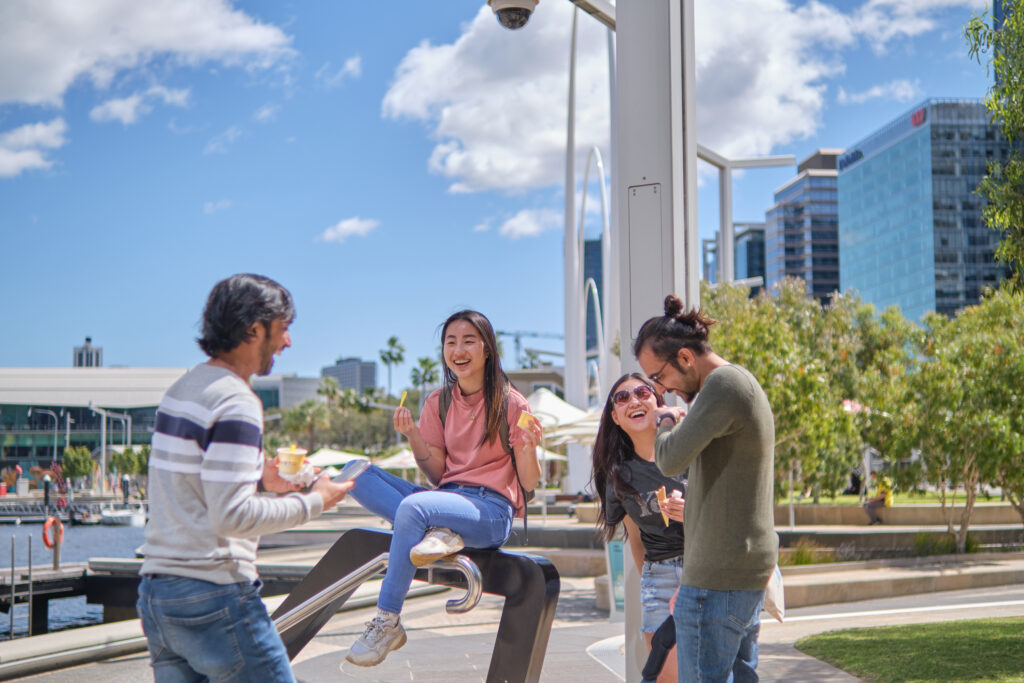As a student, making yourself more employable will always be in the back of your mind. Should I be doing more extracurricular activities? Do I have to attend career fairs? What about focusing on my studies amongst all of that?
We spoke to Elizabeth Hendry, Careers and Employment Team Leader at Charles Darwin University in Darwin, for all her expert tips on becoming the most employable international graduate possible.
When should I start thinking about my career? Is it ever too early?
Start thinking as early as possible! It is never too early to start thinking about your career. You have probably already started thinking about it before you get to university because you have to make choices around what subjects you take in high school. That leads into what degree you want to do to end up where you want to take your career.
Students that are already in university should start thinking about their career choices and goals from the beginning of first year. It takes a semester or so to settle into university life, so you might not think about it then. At some point in your first year you should start thinking about what you’re going to be doing at the end of your course.
During the course, you should start thinking about different goals and ramping up the sorts of activities that you’re doing that will hold you in good stead for when you finish. [This will help you] be as employable as possible.
What are some of the main qualities or skills that employers are looking for?
They’re looking for technical skills, which students should be getting from their degree course, but they’re also looking for soft, or transferrable, skills:
- People who can communicate well – both written and verbal communication
- Good interpersonal skills – people that can get along with other people within their teams and other external agencies
- Good team players – those who can work well in a team and can lead the team if they have to, but they don’t always have to be a team leader
- Self-management – time-management, meeting deadlines, working on different things concurrently
- Emotional intelligence – making sure that you have good understanding of what’s happening around you and with other people in the office, different workstyles and how to approach different people from a cross-cultural standing
- Critical and creative thinking – problem-solving and decision-making, being able to look at a problem critically and come up with a creative solution to it
- Positive attitude
- Resilience – people that are able to cope with change, that are still able to accept that change in a positive way
- A lifelong learner – just because you’ve finished your degree, it doesn’t mean that’s the last thing you’re ever going to learn. They want someone who is curious about things, going into further study, or keeping up with their professional development and learning new things
How can I build these skills while I’m studying?
International students should take every opportunity they get to practise their English, because that will hold them in good stead at the end when it comes to interview time. Any activities that will help them with that, they should get involved with. These include:
- Part-time jobs
- Volunteering
- Community work, e.g. getting involved with international student associations
- Attending seminars or workshops or networking opportunities that are held on-campus
- Being active members of your professional association. For example, for accounting students, you might want to sign up as a student member of CPA
But remember to balance your studies
You should take every opportunity that comes along, while still maintaining a good balance. Participate in as many activities as your study schedule will allow you to do – you’re here for uni and you need to make sure you’re passing your course. It’s about finding that balance – you’ll be gaining lots of life and transferable skills as time goes on, along with technical skills.
How can a part-time or casual job help build the skills necessary for a successful career?
Working in a part-time job is a great way for international students to practise their English. You’ll also be developing your soft skills in an Australian workplace, which is important. You might come with a lot of work experience from your home country, but Australian employers really value Australian workplace experience. Whether it’s ‘Maccas’ or Woolworths, any experience is good experience.
You’ll be building up communication skills, teamwork skills, resilience, time-management – all those things are skills that you use no matter whether you’re in customer service in McDonald’s or customer service in a larger business. The fundamentals are the same.
What are your tips for securing an internship?
It’s not going to be easy
Internships are few and far between – they’re not easy to get. Some of your courses will have a professional practice placement or an internship, which will make it easier, as employers are aware of that. Finding an internship off your own back is a little more difficult.
Make sure to network
You have to access your network – that’s where being a part of professional associations, like CPA, can help. Because if you’re in that environment networking, you’ve got lots of opportunities to talk to people about what you’re doing, what you’d like to do, and ask if they have opportunities that might be useful.
Search for ‘vacation programs’
You should also be looking at taking on vacation program roles. Larger organisations offer employment over the breaks between the semester – usually around July/August and again over the summer break. These are usually paid placements and excellent work experience. You’re building skills and getting industry experience.
Update your resume and have a pitch
You need to have your resume up-to-date if you’re going to approach employers directly, and have a pitch about yourself – who you are, what you’re currently doing, what you’d like to be doing. And, you have to be able to present yourself in a positive way.
Be proactive
There’s not a lot of internships that are actually advertised. Most internships that are outside of a university course would be called ‘vacation programs’ or be sought through networking.
What can I do while undertaking an internship to make myself more attractive to employers?
- Work hard while you’re there
- Build positive relationships with everyone in the team
- Learn as much as you can
- Ask as many questions as you need to ask to make sure you have a good understanding
- If you find an opportunity to offer some positive advice or streamline a process, have the ability to speak up about those things and speak to a supervisor
You never know when an internship might lead to a job later on, so it’s a good opportunity to see if you like that company and if that company likes you. You just have to be performing at your best while you’re there.
What are some of the attributes that I can offer employers?
- A good work ethic – particularly if you’re coming to Australia with the view to work here at the end of your studies, international students are very keen to work and succeed in everything they do
- Bring a different point of view – quite often, international students have experience in their home country and you bring that with you
- Cross-cultural understanding and diversity – this is always important in a workplace
- Level of maturity and independence that comes from having to move overseas, set yourself up in a home, and manage your work and study
What are some of the most common mistakes you see among international students when it comes to the employment process?
Not tailoring your resumes to the job
You might think that your resume from your home country is going to be the right sort of resume to use here – that is not necessarily the case. Also, using the same resume for every job [and] not taking the time to tailor a resume for a particular job that they’re looking to get.
Not thinking about the interview beforehand…
…and not doing some research about the organisation or thinking about what sorts of questions they might be asked and pre-preparing some answers for that.
Not being confident with your English
English is a big issue for most international students – not having practised your English enough, or not being familiar with terms that might be used in an interview or a workplace.
At Charles Darwin University, our Academic Language and Learning Success Program (ALLSP) offers English Language Development discipline-specific workshops for students from non-English speaking backgrounds. In these workshops, they practise their communication skills working on Volume (Loudness), Pitch (Rise and Fall), Pace (Rate) and Intonation using industry-specific terms. ALLSP also offers more casual English development through its “Chance to Chat” online sessions where students can continue to practise.
What are some of the initiatives offered by Charles Darwin University to help international students gain employment?
We have a really terrific resource and tool called My Career Centre – that has lots of things in it that you can do on your own. It’s self-paced, there are e-learning modules, a cover letter and CV builder, an interview simulator so you can set up questions and practise record yourself and listen back, [and] there’s self-assessment tools to assess how confident you are in different areas. Depending on how you answer those questions, it will point you to e-learning modules. There’s a job search engine in there as well, plus assessment centre tools with aptitude tests – this is all in a one-stop-shop online set of resources.
You also have access to individual career counselling, so you might start in the My Career Centre, do some work, then you might come and see one of our career counsellors to fine-tune things and check that you’re on the right track. We run workshops that are inside classes and also externally – employers come on campus for networking opportunities, presentations, class visits.
We also run a careers fair every year [Editor’s note: the 2020 fair is cancelled due to the COVID-19 outbreak]. There are also volunteering fairs, so not-for-profits come to campus and students can interact with them and find ways to volunteer and gain some more skills.
Final tips?
- Try and get experience early – it doesn’t matter what experience it is
- Be active at university in student organisations and professional associations
- Start working on your resume early
- Don’t forget about your studies!
- Good grades do impress employers, but they’re not the only thing that impress employers
*Interview has been edited for clarity






